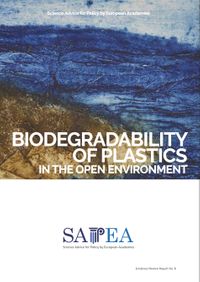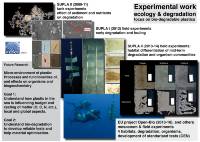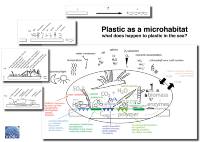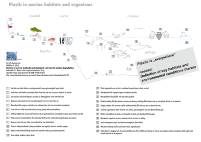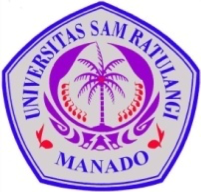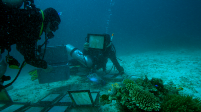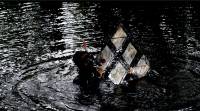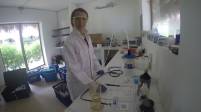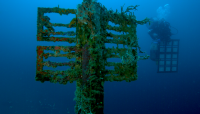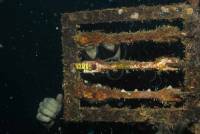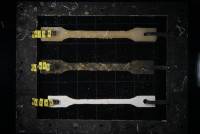RESEARCH ON BIO-DEGRADATION OF PLASTIC IN THE AQUATIC ENVIRONMENT
Since more than a decade HYDRA has accumulated a wealth of expertise in testing the performance of biodegradable polymers and blends in the aquatic environment. Together with academic partners, public institutions, NGOs and industry we have been involved in research projects, contracts, workshops, expert hearings, outreach and the development of international standard tests.
All our experience was brought into the collaborative work of compiling the Evidence Review Report on Biodegradability of Plastics in the Open Environment of SAPEA (Science Advice for Policy by European Academies) together with other experts from Europe. The report was handed over to the European Commission on Dec 14th 2020 and will help to inform decision makers on European level.
The full report can be found on the SAPEA website:
https://www.sapea.info/topics/biodegradability-of-plastics/
How to test the biodegradability of plastic under real natural conditions
Developing reliable in-situ tests for the coastal marine environment (EU Project Open-Bio, 2013-2016). See the video we produced for the project:
Bringing lab research into the field has been one of the key motives of our work from the beginning. HYDRA is known for its development of new methods and their adaption to the underwater world. Cross-linking field and laboratory experimentation has led to several highly successful research projects in basic and applied science.
2009 to 2016:
Publications and reports:
De Vogel FA, Goudriaan M, Zettler ER, Niemann H, Eich A, Weber M, Lott C, Amaral-Zettler L (2024) Biodegradable plastics in Mediterranean coastal environments feature contrasting microbial succession. Science of The Total Environment 172288. https://doi.org/10.1016/j.scitotenv.2024.172288
Sander M, Weber M, Lott C, Zumstein M, Künkel A, Battagliarin G (2023) Polymer Biodegradability 2.0: A Holistic View on Polymer Biodegradation in Natural and Engineered Environments. Springer Berlin Heidelberg. https://doi.org/10.1007/12_2023_163
Bhalerao A, Dueker U, Weber M, Eich A, Lott C, Endres HJ, Nogueira R (2023) Bacterial diversity of biofilms on polyhydroxybutyrate exposed to marine conditions: Ex-situ vs. in-situ tests. Science of The Total Environment, 905, 167458. https://doi.org/10.1016/j.scitotenv.2023.167458
Askham C, Pauna VH, Boulay A-M, Fantke P, Jolliet O, Lavoie J, Booth AM, Coutris C, Verones F, Weber M, Vijver MG, Lusher A, Hajjar C (2023)
Generating environmental sampling and testing data for micro- and nanoplastics for use in life cycle impact assessment. Science of The Total Environment, Volume 859, Part, 2023,160038, doi.org/10.1016/j.scitotenv.2022.160038.
Lott C, Eich A, Weber M (2022) Degradation of Fibrous Microplastics in the Marine Environment. In: Polluting Textiles - The Problem with Microfibres, edited by Judith S. Weis, Francesca De Falco, Mariacristina Cocca. Routledge, London, 2022. Chapter 8. doi: 10.4324/9781003165385-10
Eich A, Weber M, Lott C (2021) Disintegration half-life of biodegradable plastic films on different marine beach sediments. PeerJ, 9:e11981 DOI 10.7717/peerj.11981
Vaksmaa A, Knittel K, Abdala Asbun A, Goudriaan M, Ellrott A, Witte HJ, Vollmer I, Meirer F, Lott C, Weber M, Engelmann JC and Niemann H (2021) Microbial Communities on Plastic Polymers in the Mediterranean Sea. Front. Microbiol. 12:673553. doi: 10.3389/fmicb.2021.673553
Lott C, Eich A, Makarow D, Unger B, van Eekert M, Schuman E, Segre Reinach M, Lasut MT, Weber M (2021) Half-life of biodegradable plastics in the marine environment depends on material, habitat, and climate zone. Front. Mar. Sci., 06 May 2021 | https://doi.org/10.3389/fmars.2021.662074
Albertson A-C, Bødtker G, Boldizar A, Filatova T, Prieto Jimenez MA, Loos K, Poortinga W, Sander M, Seppälä J, Thompson R, Weber M (2020) Biodegradability of Plastics in the Open Environment. Berlin: SAPEA, Science Advice for Policy by European Academies. DOI 10.26356/biodegradabilityplastics (report)
Lott C, Eich A, Unger B, Makarow D, Battagliarin G, Schlegel K, Lasut MT, Weber M (2020) Field and mesocosm test methods to assess the performance of biodegradable plastic under marine conditions. PLoS ONE 15(7):e0236579 doi: https://doi.org/10.1371/journal.pone.0236579
Ornik J, Sommer S, Gies S, Weber M, Lott C, Balzer JC, and Koch M (2020) Could photoluminescence spectroscopy be an alternative technique for the detection of microplastics? First experiments using a 405 nm laser for excitation.
Appl. Phys. B (2020) 126: 15. https://doi.org/10.1007/s00340-019-7360-3
Eich A, Lott C, Weber M (2019) Half-life as a specific material property - modelling the performance of biodegradable plastics in different environments. International Conference on Microplastic Pollution in the Mediterranean Sea, Capri 15-18 Sept. 2019. (poster)
Weber M, Eich A, Lott C (2019) How to prove claims on biodegradability of plastics? Overview of available standard tests and their environmental relevance. International Conference on Microplastic Pollution in the Mediterranean Sea, Capri 15-18 Sept. 2019. (conference abstract)
Lott C, Eich A, Lasut MT, Weber M (2019) It depends where it ends – biodegradable plastic degradation differs between habitats, and climate zones. International Conference on Microplastic Pollution in the Mediterranean Sea, Capri 15-18 Sept. 2019. (conference abstract)
Lott C, Eich A, Unger B, Makarow D, Lasut MT, Weber M (2018) Performance of bio-degradable plastic in the marine environment. MICRO 2018, Fate and Impact of Microplastics: Knowledge, Actions and Solutions. Lanzarote, 19-23 November 2018. (poster)
Eich A, Lott C, Weber M (2018) The determination of half-life of biodegradable polymers in the marine environment. MICRO 2018, Fate and Impact of Microplastics: Knowledge, Actions and Solutions. Lanzarote, 19-23 November 2018. (conference abstract)
Lott C, Eich A, Weber M (2018) Can biodegradable plastic contribute to the mitigation of marine plastic pollution? MICRO 2018, Fate and Impact of Microplastics: Knowledge, Actions and Solutions. Lanzarote, 19-23 November 2018. (conference abstract)
Weber M, Makarow D, Unger B, Mortier N, De Wilde B, van Eekert M, Schuman E, Tosin M, Pognani M, Degli Innocent Fi, Briassoulis D, Mistriotis A, van der Zee M, Lott C (2018) Assessing Marine Biodegradability of Plastic—Towards an Environmentally Relevant International Standard Test Scheme. M. Cocca et al. (eds.), Proceedings of the International Conference on Microplastic Pollution in the Mediterranean Sea, Springer Water, https://doi.org/10.1007/978-3-319-71279-6_15. (conference abstract)
Lott C, Eich A, Pauli NC, Mildenberger T, Laforsch C, Petermann JS, Lasut MT, Weber M (2018) Marine Fate of Biodegradable Plastic—Substitution Potential and Ecological Impacts. M. Cocca et al. (eds.), Proceedings of the International Conference on Microplastic Pollution in the Mediterranean Sea, Springer Water, https://doi.org/10.1007/978-3-319-71279-6_15. (conference abstract)
Lasut MT, Weber M, Pangalila F, Rumampuk NDC, Rimper JRTSL, Warouw V, Kaunang ST, Lott C (2018) From Coral Triangle to Trash Triangle—How the Hot spot of Global Marine Biodiversity Is Threatened by Plastic Waste. M. Cocca et al. (eds.), Proceedings of the International Conference on Microplastic Pollution in the Mediterranean Sea, Springer Water, https://doi.org/10.1007/978-3-319-71279-6_15. (conference abstract)
Pauli NC, Petermann JS, Lott C, Weber M (2017) Macrofouling communities and the degradation of plastic bags in the sea: an in situ experiment. R. Soc. open sci. 4: 170549. http://dx.doi.org/10.1098/rsos.170549
Lott C, Weber M et al (2016) Marine degradation test field assessment. European Commission, Project Open-BIO, KBBE/FP7EN/613677, WP5-D5.8. (report)
Lott C, Weber M et al (2016) Marine degradation test assessment: Marine degradation test of bio-based materials at mesocosm scale assessed. European Commission, Project Open-BIO, KBBE/FP7EN/613677, WP5-D5.7 part2. (report)
Weber M, Lott C et al (2015) Review of current methods and standards relevant to marine degradation. Open-BIO deliverable D5.5. Project report to the European Commission. (report)
Eich A, Mildenberger T, Laforsch C, Weber M (2015) Biofilm and Diatom Succession on Polyethylene (PE) and Biodegradable Plastic Bags in Two Marine Habitats: Early Signs of Degradation in the Pelagic and Benthic Zone? PLoS ONE 10(9): e0137201. doi:10.1371/journal.pone.0137201
Tosin M, Weber M, Siotto M, Lott C, Degli Innocenti F (2012) Laboratory test methods to determine the degradation of plastics in marine environmental conditions. Frontiers Microbiol. doi: 10.3389/fmicb.2012.00225
related:
ISO 19679:2016(en): Plastics — Determination of aerobic biodegradation of non-floating plastic materials in a seawater/sediment interface — Method by analysis of evolved carbon dioxide
ISO 18830:2016(en): Plastics — Determination of aerobic biodegradation of non-floating plastic materials in a seawater/sandy sediment interface — Method by measuring the oxygen demand in closed respirometer
Being marine biologists our approach is an ecological one. In order to test biodegradation in the natural environment knowledge about the conditions in the relevant habitat is essential. Our worldwide work in more than hundred research projects and expeditions in the last 30 years provided us with personal insight into most of the aquatic habitats of the planet. We use this experience to tailor experiments, consult on environmental and ecological questions and be the ground truth reference for our partners and clients.
HYDRA brings its hands-on knowledge of the world's oceans, rivers and lakes into every project. We interact with businesses, policy makers, academia, environmental groups and civil society to connect and create synergies. Our global network of partners and the direct contact to the single person is what is enabling transdisciplinary communication.
BioPlasDeg Asia (2016 - 2023)
in collaboration with Sam Ratulangi University, Manado
After 10 years of biodegradable plastic research in the Mediterranean Sea we started a cooperation with Sam Ratulangi University UNSRAT in Manado, Sulawesi, Indonesia. Here, in the wet tropics of SE Asia we refine the methods and extend our tests to another climate zone. Being the hot spot of biodiversity this area heavily suffers from the rapidly increasing amount of waste in rivers and the ocean.
MaBiKu (2019 - 2023)
in collaboration with IfBB, ISAH and IKK (all Hannover) and DIN CERTCO, Berlin
partially funded by the German Ministry of Food and Agriculture (BMEL) with its project management agency FNR e.V. (Fachagentur für Nachwachsende Rohstoffe)
MaBiKu aims at developing biobased plastics that are biodegradable in the marine environment. Together with partners from the newly established Institute for Polymers and Circular Technology (IKK) and the Institute of Sanitary Engineering and Waste Management (ISAH), both at the Leibniz University Hannover, and from the Institute for Bioplastics and Biocomposites (IfBB) at the University of Applied Sciences and Arts, Hannover we will design and test demonstrators for special applications where a loss into the natural environment is probable, e.g. in the fisheries sector. DIN Certco and associated partners from industry will support us with special expertise.
